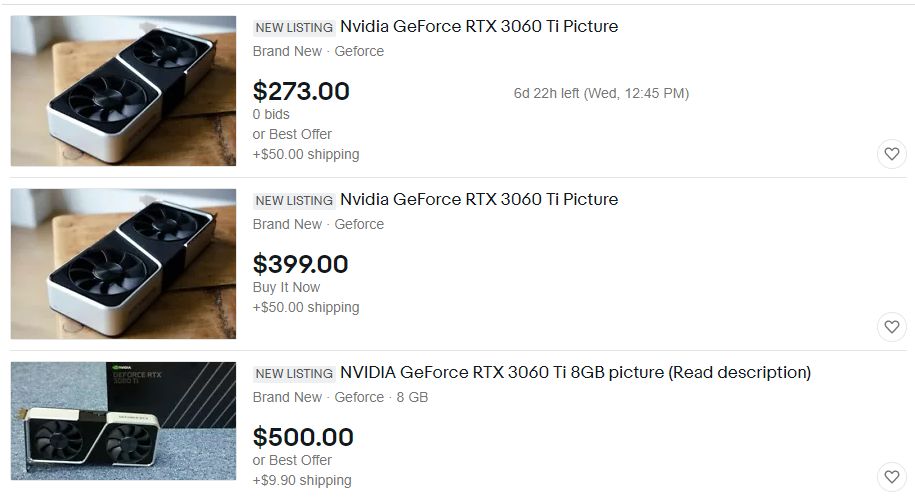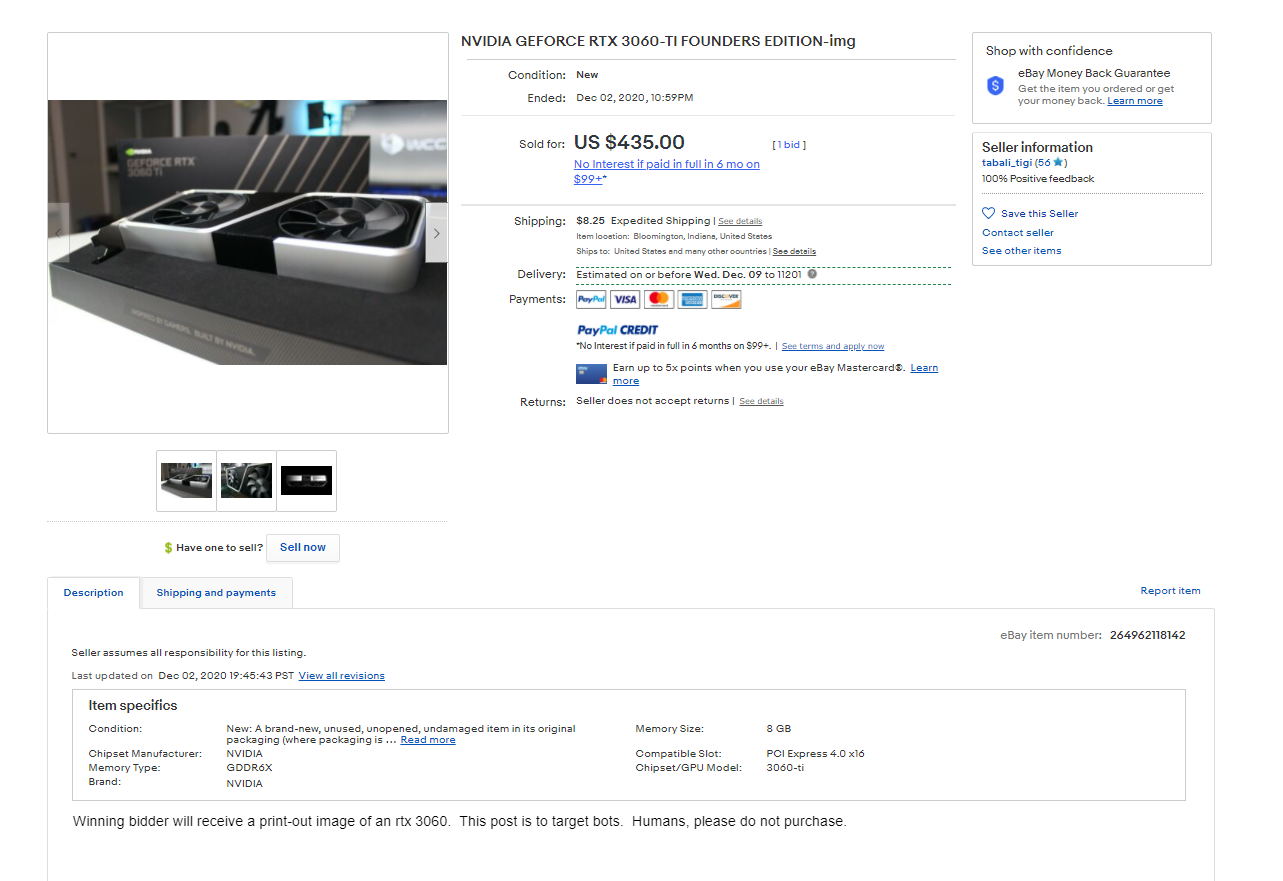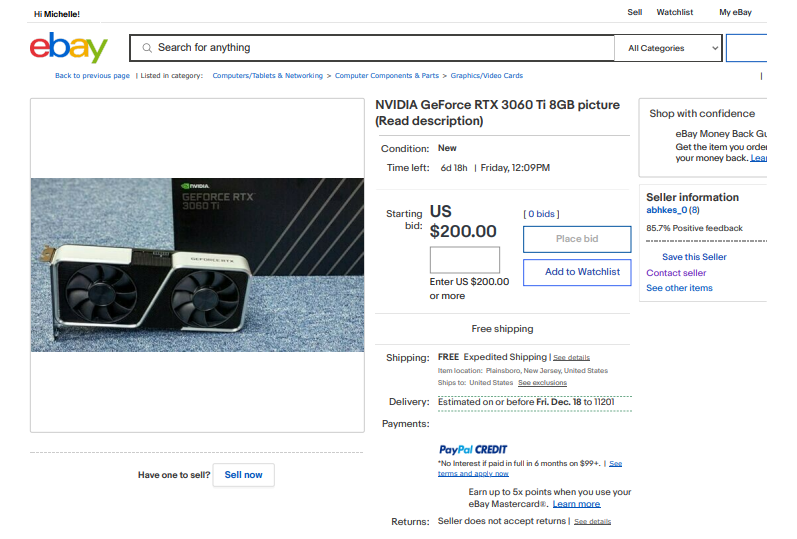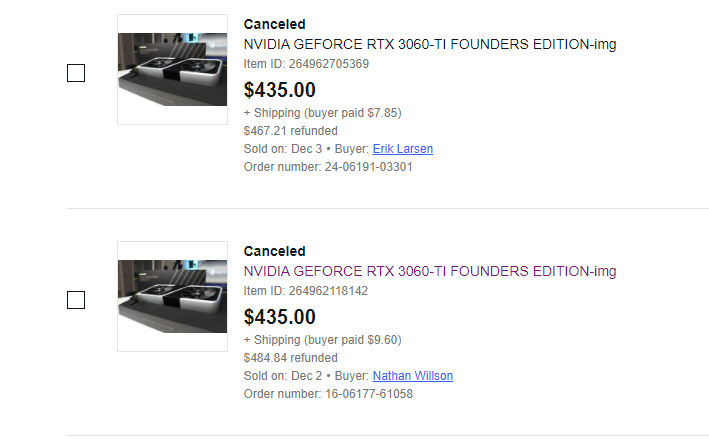Scam the Scalpers? eBay Vigilantes Are Selling Pics of RTX 3060 Tis
Who scams the scammers?
eBay scams that try to trick unsuspecting, innocent people into spending all their hard-earned cash on a photo or an empty box are nothing new, but what about when those same scams are aimed at scalping bots? That’s the latest anti-bot trend to rise out of the GeForce RTX 3060 Ti launch, which like other Ampere cards before it, sold out within minutes of release thanks to bots buying up all the stock to resell at a markup on auction websites like eBay and stockX.
If you haven’t been paying attention to the tech enthusiast scene lately, 2020’s taken its toll on us too. This year’s seen plenty of fancy new hardware come out, from the new best graphics cards to the new best cpus to the next generation of game consoles, but only technically. For the average buyer, most of it might as well still be in development. That’s because bots run by resellers (colloquially known as scalpers) are buying up all the new, reasonably priced official stock and immediately selling it on aftermarket websites for markups that are as high as double the MSRP or more.
This problem’s been around for a while, but 2020 has only made it worse. The pandemic means that most people can’t make trips to physical retail stores that bots can’t camp (yet), plus it’s hampered the amount of product manufacturers can actually put out. No one’s quite sure how to counter the Skynet revolution yet, but a few stores have tried staggered stock rollouts and, despite everything, in-store only pickup. Still, these solutions only slightly widen the availability net. Stock refreshes still sell out quickly, and in-store purchases are limited by area and the health/vulnerability of prospective buyers. Worse, because bot orders still earn stores money, they aren’t incentivized to put their all into fighting them.
No wonder enthusiasts themselves have started a new arms race against scalpers to try to get their hands on the RTX 3000 series and Radeon RX 6000 series GPUs at fair prices.
So far, we’ve seen gamers build bots of their own to notify them when new stock comes in, plus bots that use burner accounts to place bogus, ludicrously high orders on eBay auctions to try to get them taken down. But the latest strategy we’ve seen enthusiasts adopt co-opts an age old scam to try to turn it back against scalpers: false eBay listings.

Since eBay’s launch in 1995, customers have had to carefully read listings and descriptions when searching for hot ticket items. That’s because plenty of major purchases come with a number of suspiciously cheap auctions that are actually just selling physical/emailed photos or empty boxes instead of the items in the listing’s picture or name. We’ve seen it with the PS5, the RTX 3080 and even the older Xbox 360. And now we’re seeing it with the RTX 3060 Ti, but in a different light.
While these listings usually use product description boxes or the tail end of their titles to disclose that the items they’re selling aren’t what they appear to be on first sight, the idea here is to mislead unsuspecting buyers who don’t read item descriptions into thinking that they’re buying the real thing, while still being “honest” enough to claim plausible deniability when questioned. This makes them perfect for scamming people who are less tech savvy, or so excited that they hit the buy button without scrolling down (sometimes several pages) to read the description.
But, according to a few new cyber vigilantes, fake listings are also perfect for tricking the same keyword-searching scalper bots that drive people to the aftermarket in the first place. This is what we’ve seen with the RTX 3060 Ti launch, where this old scammer tactic seems to have drifted from being turned on innocent buyers to supposedly fighting scalper bots, assuming you take this new crop of photo listings at face value.
It’s cyber-vigilante action, but as with any good vigilante drama, there’s still risks for the good-intentioned, plus bad actors looking to take advantage of others all while playing the hero.
Shortly after the Nvidia GeForce RTX 3060 Ti, the latest Ampere GPU, launched and promptly sold out from official stores, we saw misleading photo listings pop up as expected. But this time, most of the ones we saw had descriptions asking people not to buy the items, and were instead supposedly targeting scalpers and bots instead of actual consumers. This was a new development.
Get Tom's Hardware's best news and in-depth reviews, straight to your inbox.

Let’s list an example.
On December 2nd, eBay user tabali_tigi set up an auction called “NVIDIA GEFORCE RTX 3060-TI FOUNDERS EDITION-img.” At first blush, we thought it was one of the same photo scams we saw with previous Ampere cards. But unlike those listings, the description here fully admitted to being a scam. It’s just that it was a scam intended for robots instead of human beings.
“Winning bidder will receive a print-out image of an rtx 3060. This post is to target bots,” it read. “Humans, please do not purchase.”
We were a bit skeptical about whether the reasoning here was legitimate or just meant to protect the seller from harm, but it wasn’t long until we saw similar listings. Over the next few days, we kept track of people selling RTX 3060 Ti picture listings with descriptions ranging from “This is a bot/scalper deterrent listing!” to “Please don’t buy this if you’re not a bot.” Eventually, we had dozens of these listings in hand, and it was clear that this anti-bot “scam” was becoming a trend.
The idea, as these vigilante sellers would put it, is that bots searching eBay for rare graphics cards would, at the very least, buy these instead and lose out on money. At most, bots that seek to drive up the general price for graphics cards on eBay with false bids (think of an auction house planting workers in the audience to place fake bids and drive up the price of items) might bid on these listings instead of ones put up by scalpers.
But with this tactic’s history as a scam that’s meant to be directed towards human beings, we weren’t entirely convinced. Several photo listings had copied and pasted descriptions, and while not every photo listing made this stipulation, about half of the listings we’d collected reminded buyers that “absolutely all sales are final and no refunds will be issued!”
So we reached out to some of the sellers on these listings, to see if they could walk us through their thought process a bit more.

By far, the most talkative seller was tabali_tigi, whose real-life name is Larry Bates. Bates is a cybersecurity expert with two Master’s degrees who is currently studying for his doctorate, and who co-founded Bitland, a blockchain company that Time spotlighted in 2018 for helping Ghanaians prove ownership of their land- a major issue in the country, given that 90% of land in Ghana is estimated to be unregistered.
“We advised many governments on cybersecurity, [which] is why I do things like fight scalpers in my spare time,” he told us.
“I have been observing scalper behavior across multiple sectors i.e. shoes, video game consoles, gpus and have been extremely infuriated at the effect of scalpers on the market,” Bates said when we asked why he decided to start making photo listings on eBay. “When a scalper uses bots to buy all products released, and they are all on eBay within the first hour of release, there is no primary market. Scalpers and bots have made all markets effectively secondary markets in a time when supply chains have been hit.”
With that in mind, he set out to sell photos on eBay that were “intended to trap bots that were attempting to find low-priced items to bid on/buy.”
We’re most used to seeing bots buying from primary sellers, but Bates claims that with the distinction between the primary and secondary market eroding, bots have turned their buying and reselling tactics towards sites like eBay, and combined them with false bids that inflate prices for graphics cards on the platform overall. This is what he told us he’s targeting.
“When the primary supply goes so quickly, bots are then used for other purposes such as ‘bidding up’ values to make money on their own scalped item,” he explained. “It's not that the bots would be intending to ‘buy’ an item, but they are set to ‘bid up’ items between a certain range.”
Of course, bidding up your own item isn’t especially helpful if other listings are undercutting you, and that’s why scalper bots will trawl through eBay as a whole to bid up competitor’s listings as well. eBay also takes a 10 percent commission on listings, but maxes out the fee at $750, so according to Bates, these bots will also try to get listings past the commission so that any further bids are pure profit.
“The scalper bots that bid up prices intend to get prices of a particular item up to a point where it's past the fee for eBay to make it worthwhile for the scalper,” he explained. “This is why they use their bots to take the price to sometimes 200%+ markup on MSRP.”
But Bates said his hope is that fake listings like his can help curtail that increase in value if bots bid on them instead, which could theoretically make eBay untenable for scalpers in the long term.
Another of the photo sellers, abhkes_0, said that as someone who has developed similar bots to what scalpers use before, they’re now following the same strategy outlined by Bates.
“The reason I’m doing this is because I’ve seen how bots have started scraping the second hand market as well,” they told us over eBay message. “Many of them are sending bids up on items, creating a false scarcity. As one who has developed such bots myself, I know the types of things they look for on eBay, and how it can hurt other buyers. These bots ideally have a set number of items to bid on, and by creating such listings, it’s possible to throw these off.”

Others we spoke to weren’t playing the same kind of long game, but reportedly had the same anti-scalper goals in mind. Connomoodle0 told us “I figured if someone was reselling for less than market price, then the bots will just detect RTX 3060 and a low price. [The bots] will make offers thus making sure the scammers have a huge inconvenience and maybe even lose some money.”
“If it’s true that bots are snatching up items faster than anyone can search for them, then eBay needs to do something about that,” Kaidra-47 told us.
Of course, the difficulty here comes with the photo listings catching not just bots, but also people. We found more than a handful of these listings claiming to be bot deterrents that also said all sales are final with no refund, which would mean that any consumers who accidentally fall for the supposed bot trap will have also been effectively scammed a la old photo listings. All the sellers we spoke to told us that they would refund human beings who accidentally bought their items. We have no way of testing or confirming this, however, outside of a screenshot Bates sent us regarding his own listings.
Still, even if the scam is well-intentioned, it still runs the risk of muddying the market, as not everyone is a vigilante and even vigilantes have different standards and only purport to be protecting consumers. Getting a refund directly from the seller still depends on who you buy from, which can hurt not just buyers, but also sellers.
Bates in particular told us he’s already had a few humans get “caught in the bot trap” and has refunded “almost $1000” back to them already (he also sent us an eBay screenshot as proof, which we've pictured below).
“They messaged me AFTER they sent me the money,” he explained, “in one instance thanking me for not marking up the price. In another instance, the person messaged me asking to make sure it’s real. I have a conscience, so I immediately sent the money back.”
Though not everyone was so gracious, he said.
“One account had 0 purchases, and the guy actually called me ‘stupid’ for doing this. I believe he might have been a scalper whose bot I caught.”

The other entity in these bot wars is eBay itself, whom we also reached out to for comment. According to eBay, every photo listing violates its “no item” rule, which disallows listings that aren’t for either a service or for a physical item, and the site is currently working to remove them and punish the people putting them up.
“We don’t allow for sellers to misrepresent what they’re listing for sale on eBay,” eBay communications representative Ashley Settle told us. “We are in the process of removing listings for photos of the graphics cards from our marketplace and will be taking appropriate action against the sellers.”
This applies to both black hat and supposedly white hat listings, though it comes with an upside- guaranteed refunds for anyone who does get scammed.
“eBay has policies in place to protect both the buyer and seller when a transaction is made,” Settle told us. “Our eBay Money Back Guarantee ensures that if the item arrives and is significantly different from what was in the listing description, they are able to return the item and receive a refund.”
Most photo listings attempt to work around this by adding a disclaimer about the sale just being for a picture somewhere in the title or description, though because the listings overall are still misleading, Settle told us that “These will be covered on eMBG because the listing is prohibited.”
When I asked Bates what he thinks of the other RTX 3060 Ti photo listings and the possibility that they might be scams despite claiming to only target scalpers, he said “I have seen them, and honestly I would believe there are just as many scalpers who have seen this now attempting to just scam people unfortunately.”
He also acknowledged the economic threat posed by photo listings overall, and said “I sincerely hope federal authorities realize that people are paying $500 for pieces of paper. That act actually devalues the dollar in the long run.”

Which leaves us in a gray area. On the surface, trying to scam bots on eBay seems fruitless, since that’s also where bots sell their goods. As we saw with copy-pasted photo listings, the platform could eventually devolve into bots scamming other bots. Bots can also theoretically adapt to these tactics, filtering out listings that include words like “photo.”
But after talking to some of the people behind photo listings, they start to make a bit more sense.
While we can’t verify the intention behind every photo listing and whether every individual seller is willing to refund human beings, the idea is to stop bots from pushing prices even further up through bidding on their own items. This theoretically protects value and makes eBay less profitable for scalpers overall. In the meantime, it also means scalpers might have to deal with the headache of contacting eBay for a refund if they’re caught in one of these traps.
Vigilantes can also adapt, too, which is why Bates told us he’s seen some people selling “poems” now instead of photos.
The strategy isn’t perfect, though, and even if a seller is genuine and willing to refund human beings caught in their traps, there’s still risks associated with getting people’s hopes up, wasting their time, temporarily separating them from their money, and creating a heroic cause genuine scammers can pretend they belong to.
There’s also the reality that scamming scalpers still makes this photo listing venture potentially profitable for even the most well-intentioned vigilantes. While the photo listing sellers we spoke to told us that they’re returning money to buyers they’re reasonably convinced are “real people,” they also said they wouldn’t return money to buyers they think are scalpers.
“For the scalpers...fuck em,” Connomoodle0 told us.
“I have no problem scamming scalpers,” Bates told us. “I have 0 problems taking money from unethical people.”
While this might seem fair on the surface, the unfortunate side effect here is that these vigilante scams run the risk of effectively turning sales on these auction sites into a sort of CAPTCHA, where if you fail to prove you’re human, you could be out hundreds of dollars. And because each person’s standards for who counts as an actual customer could be different, and because vigilantes stand to earn hundreds of dollars if they write you off as a scalper, and because there are old-fashioned scammers mixed in with them, your chances of getting a refund from the seller might be limited, though eBay itself is almost certain to step in if you file a formal complaint.
Bates acknowledged this too, saying “Many people are choosing to keep the money regardless of whether they received it from a scalper or not.” He’s since pulled his listings because of these issues.
This all brings up the question of whether it’s possible or even beneficial to create a “more ethical” space for resellers. No matter how much you clean up the gray market, buying a new graphics card from eBay is always going to mean less stock from official sources.
But as enthusiasts face empty promises from manufacturers and silence from both primary retailers and platforms that enable scalping like eBay, some feel like gray market vigilante action is the only recourse available to them.
“Scalpers are inadvertently running a dilution attack on ‘value’ in the markets they attack,” Bates said. “If eBay killed the scalping market, people like myself wouldn't have to go after the scalpers…[but] since the government is not making scalping illegal, it's on us as citizens to do something about it.”
Regardless of their morality or efficacy, the core issue enabling scams and encouraging vigilante action is scalpers. After talking to some of the people behind these listings ourselves, so long as platforms allow resellers free reign, listings like these photos will always pop up, even as eBay works to remove them.
Maybe RTX 3080 haikus will be the next trend. We've already seen this anti-scalper photo strategy retroactively applied to RTX 3080s, after all. But until the core reselling issue is resolved, we suggest carefully reading over all item descriptions before you click buy.
MORE: Best Graphics Cards
MORE: GPU Benchmarks
MORE: All Graphics Content
Michelle Ehrhardt is an editor at Tom's Hardware. She's been following tech since her family got a Gateway running Windows 95, and is now on her third custom-built system. Her work has been published in publications like Paste, The Atlantic, and Kill Screen, just to name a few. She also holds a master's degree in game design from NYU.
-
CerianK I am delaying purchases until the supply chain issues shake out... has anyone seen CAPTCHA used on any retail sites as a bot deterrent?Reply
I've heard all the rhetoric from retailers about deterring bots, but I'm curious if they have actually taken that simple logical step. If not, then why not?
That being asked/said, I have not changed my stance on pricing... I would rather see those profits go to nVidia, AMD, etc., rather than to scalpers. Starting high on MSRP and dropping it weekly would have had a big effect on availability for those in dire need, as long as the declination schedule and final low MSRP price/date are set in stone. Still, it is hard to predict demand in these odd times, so maybe less effective than I think. -
techgeek You want to stop scalpers? Don't buy from listings on eBay, or from any reseller. These resellers can't buy all the stock and when they've no more money to invest in cards that aren't selling, stock at e-tailers and retailers will be available. Then the scalpers get stuck with a bunch of cards that no one wants to buy. The consumer makes scalping profitable when they are too impatient or stupid to wait it out. Sure the benchmarks look good, but if you buy these cards at inflated prices from scalpers then you are part of the problem. More money than sense so to speak.Reply
TL;DR DON"T BUY FROM RESELLERS AT INFLATED PRICES YOU IDIOTS! -
DeathPrime Boyah madlads/comments/k5fkbrView: https://www.reddit.com/r/madlads/comments/k5fkbr/hero_taking_on_the_price_gouging_bots/Reply -
derekullo I've never used a bot before, but if they can already scan for Geforce 3060 auctions on ebay and autobuy something wouldn't it be equally as easy to put in a list of words to blacklist?Reply
"Paper card, picture only, only picture, for bots to buy" -
stancilmor It seems like slowing down the interface to human speed would place the bots on equal footing as humans. For example, if the fastest a human can click through the buttons is 10 seconds, then anything faster than 10 seconds is likely a bot. If the interface was then slowed down such that the fastest a bot or human could get through was 30 seconds, then the humans would at least not be at a speed disadvantage.Reply
I realize that no one wants to intentionally slow things down, but ultimately bots are going to be better than humans at everything. -
magbarn Reply
The problem is that these sneaker bot scum already have the links to directly add the item into their cart. The bots are also up 24/7 while us humans can't and have to work to pay for these things... There's also captcha farms in India that get through captcha in no time flat. In other words, the only way to make a level playing field is to force store pickup only or do what Apple does and allow a queue for up to several months such as the AirPods Max...stancilmor said:It seems like slowing down the interface to human speed would place the bots on equal footing as humans. For example, if the fastest a human can click through the buttons is 10 seconds, then anything faster than 10 seconds is likely a bot. If the interface was then slowed down such that the fastest a bot or human could get through was 30 seconds, then the humans would at least not be at a speed disadvantage.
I realize that no one wants to intentionally slow things down, but ultimately bots are going to be better than humans at everything. -
TheHughMan Okay. So where are all the server GPU scalpers and scammers at? Nvidia says B2B sales are just fine, but consumer products are always buried under corporations. They're probably the reason for this and the scalping scamming bull is the scapegoat.Reply -
excalibur1814 eBay? Have bots? Never. Say it isn't so. Say it isn't so that hundreds of thousands of low feedback accounts exist only to bump up auction prices. Jeff, from Italy (despite the auction stating U.K. only) bids, with only 2 feedback, only to message to say that he'd had a bike accident (forcing me to apply strict rules to ANY auction). It's not that this doesn't happen over and over again or anything.Reply
Kind of like DJI drones rising in price during the U.K. lock down?!? Lots and lots of low feedback accounts going to town at that point (I watched. I looked. I witnessed the trend).
Oh well. -
kyzarvs Ebay could end this instantly by just putting a captcha process on bidding? Of course that means less commission $$ for them so...Reply -
Co BIY It would be interesting for Toms to do a value analysis of the new cards at the estimated ebay market values.Reply
How does your current card stand up then?
Really the answer is wait to out the scammers/scalpers - don't buy new goods on a secondary market. This is not a World Cup Soccer Game, or a one-of-a-kind piece of art, everyone willing to pay msrp will eventually have the chance to buy one.
Prepaid queuing direct from the manufacturers sites seem like a good idea to me. For a company like nVidia retailers seem like an anachronism.
Not sure the so-called board partners add much either. Maybe they should be controlling their sales directly at least for Titan/90 series level products. NVidia pop-up stores in top 75 worldwide markets plus online.
